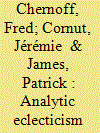| Srl | Item |
| 1 |
ID:
175154


|
|
|
|
|
| Summary/Abstract |
Some scholars in International Relations and comparative politics continue to debate how to obtain the strongest explanatory theory whereas others hold that each approach should be treated as its own area of research. Both of these groups tend to agree that factors from across paradigms cannot be coherently combined with each other. On the contrary, Sil and Katzenstein have argued for analytic eclecticism in scholarship, which would not treat research traditions or paradigms as strict limitations on theory construction. Inspired by pragmatism, they have made a compelling case that considerations of usefulness and knowledge cumulation are more important than paradigmatic fidelity. This forum examines analytic eclecticism from the points of view of neo-empiricism, feminism, and interpretive constructivism, followed by a reply by Sil. A decade has passed since the publication of Sil and Katzenstein’s Beyond Paradigms, so it seems appropriate to reflect upon the strengths and weaknesses of analytic eclecticism.
|
|
|
|
|
|
|
|
|
|
|
|
|
|
|
|
| 2 |
ID:
176027


|
|
|
|
|
| Summary/Abstract |
The endeavour to explain and predict international affairs is getting harder since it is ever more widely accepted that heterogeneous and fluid actors are making international politics. Positivists of various types have dominated the discussion on knowledge creation in the discipline of International Relations (IR), but the increasing acceptance of the dynamic character of international politics has led to the support and use of constructivist, post-Western or feminist approaches. There has also been an uptick in methodological discussions on these critical, non-positivist approaches. This article contributes to these debates by offering the first steps towards a cognitive frames–based methodology for IR. With a pragmatist ontology as its foundation, the approach re-sets the focus of analysis to the rationality of the international actors. The article, offers an initial description, by relying on illustrative examples, of the creation, the reach, durability and the organisational structure of cognitive frames in the global arena.
|
|
|
|
|
|
|
|
|
|
|
|
|
|
|
|